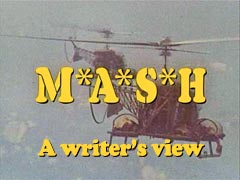M*A*S*H: A writer’s view. #11 in the series.
Now we come to the character that was the unquestioned heart of M*A*S*H: Corporal Walter Eugene ‘Radar’ O’Reilly, late of Ottumwa, Iowa, myopic farmboy, animal lover, Grape Nehi drinker, perpetual adolescent, and all-round débrouillard. When Gary Burghoff gave up the role after seven years, a considerable part of the show’s appeal left with him; also some of the audience, though not enough to seriously damage the ratings. When other actors left, their characters were replaced: Henry Blake with Col. Potter, Trapper John with B. J., Frank Burns with Winchester. Radar was irreplaceable.
The first thing we find out about Radar in ‘M*A*S*H: The Pilot’, in the very first scene before the opening credits, is that he hears incoming helicopters before anyone else. This ability, along with his nickname and his home town, came from the real-life Radar: Don Shafer, who served in Korea as company clerk to the 171st Evacuation Hospital. (Unlike Radar O’Reilly, Shafer went on to serve in Vietnam and eventually earned the rank of chief warrant officer.) In a 2009 interview, Shafer distinguished himself from his fictional counterpart: ‘I didn’t have ESP, obviously – I’m not sure if anyone does – but I was observant. I would listen for things… that nobody else was listening for.’
The novel MASH makes it clear that Radar does have ESP; the Robert Altman movie makes him do things that pretty solidly imply it; the TV series leaves it an open question. The TV Radar’s anticipations of events can generally be explained by natural causes, first among which is the sheer predictability of his superiors. Radar knows the official routine of the 4077th so well that he can put his hands on any needed paperwork five minutes before Col. Blake even knows it will be needed, and he is generally even ahead of Col. Potter. This is solidly established in the pilot episode, in the first scene where we see Radar in Col. Blake’s office. Radar has just come into the room behind Henry’s back, anticipating the call: [Read more…]








Recent Comments